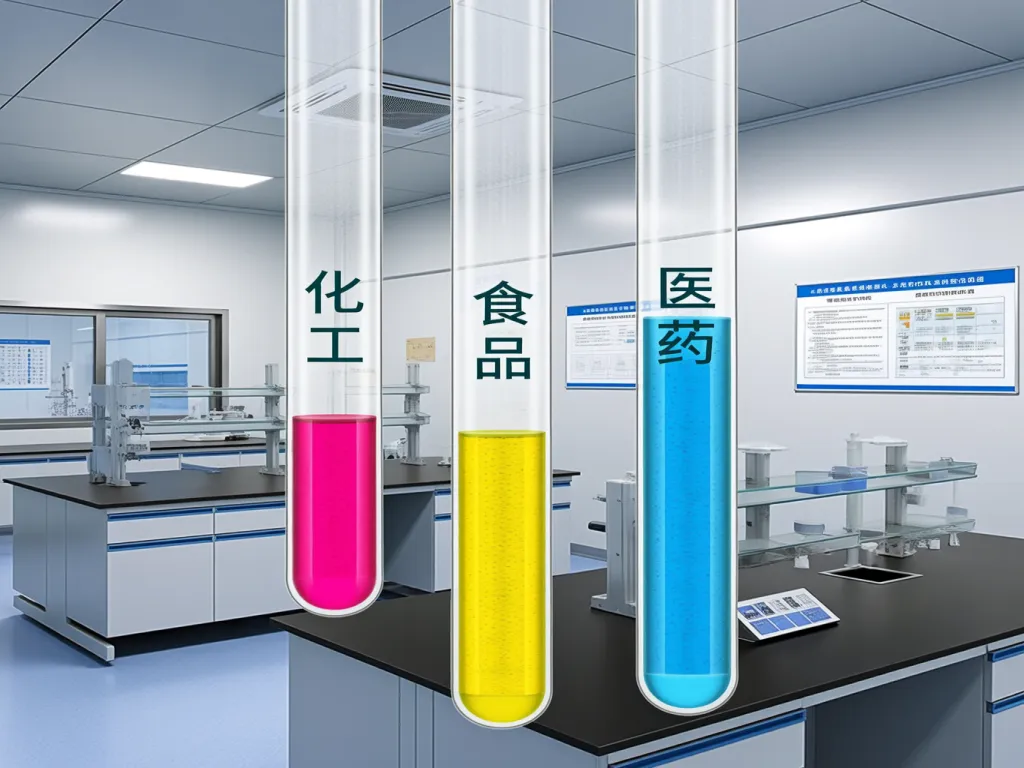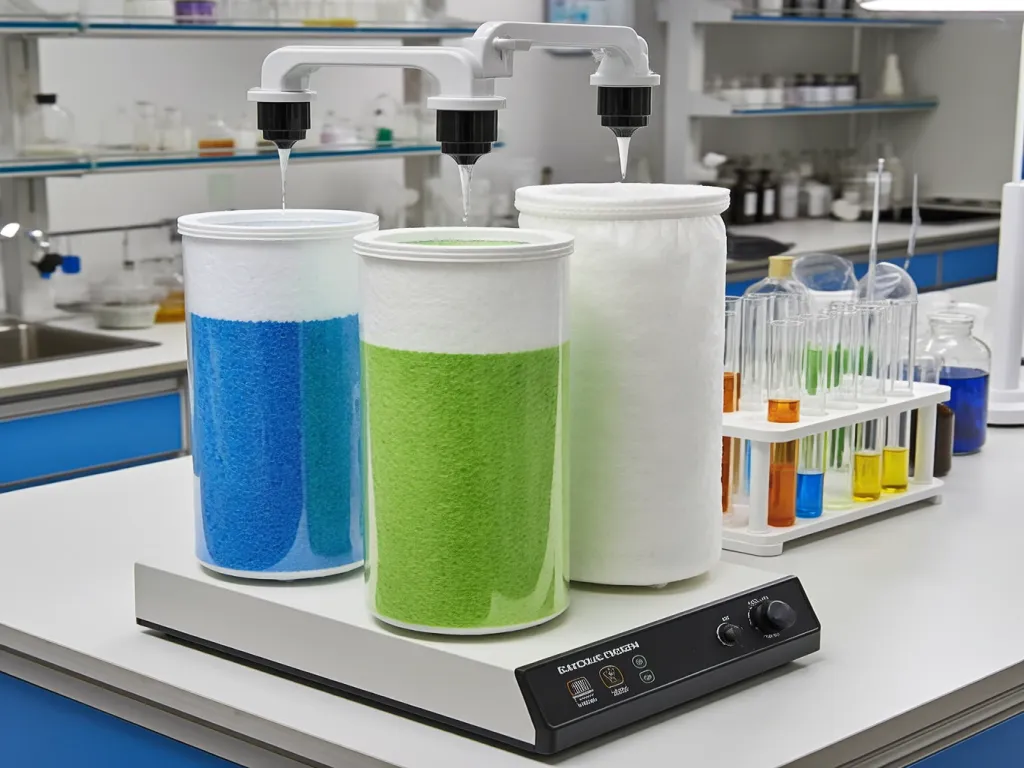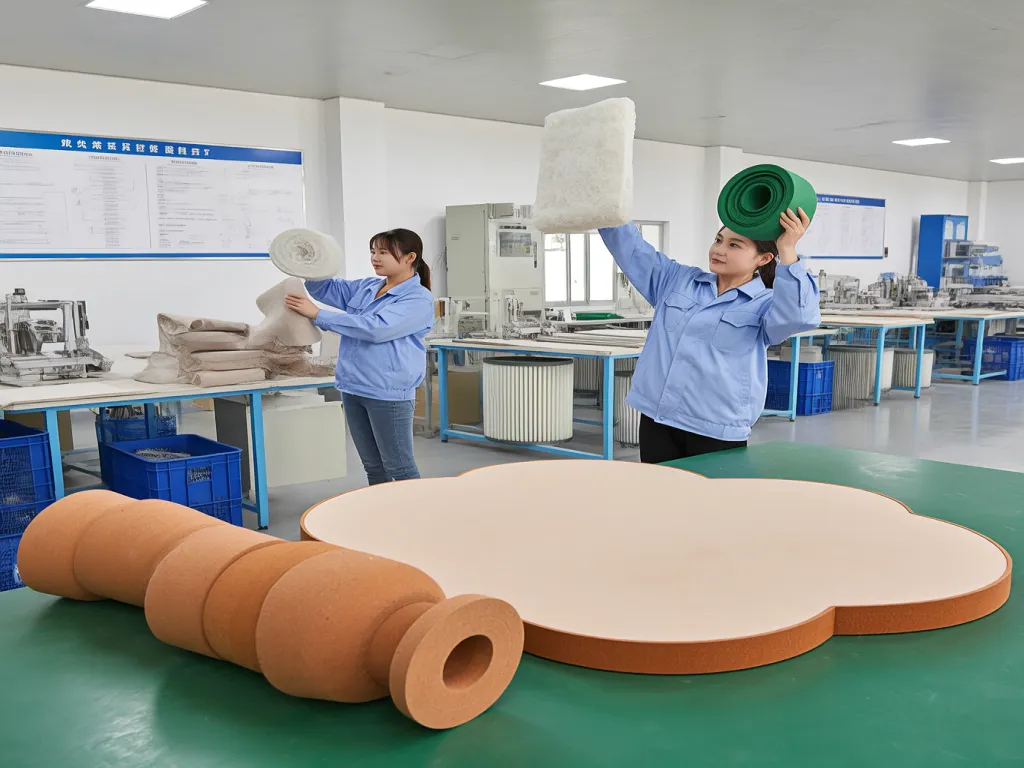Optimal Felt Filter Socks: Tailor for Your Process

In the world of industrial processes, efficiency and precision are everything. When it comes to filtration, the right felt filter sock for industrial processes can make or break your operation. Whether you’re in the chemical, food, or pharmaceutical industry, each has unique filtering demands. So, how do you pick the ideal felt filter sock that fits like a glove? Let’s dive in and find out!

Analyzing Filtration Needs Across Industries: From Chemicals to Food and Pharmaceuticals
When it comes to industrial filtration, one size certainly does not fit all. Each sector—chemicals, food processing, and pharmaceuticals—presents unique challenges and demands specific filtration solutions. Choosing the right felt filter sock for industrial processes is not just about meeting basic filtration needs; it’s about optimizing performance, ensuring safety, and maintaining compliance with industry standards. Let’s dive into the specifics of each industry to understand how felt filter socks can be tailored to meet their unique requirements.
Chemical Industry: Tackling Corrosive and Abrasive Substances
The chemical industry is notorious for its use of corrosive, abrasive, and often hazardous substances. Filtration in this sector must withstand extreme pH levels, high temperatures, and chemical reactivity. Felt filter socks used here need to be constructed from materials that offer superior chemical resistance and durability. Polyester and polypropylene felts are popular choices due to their ability to resist degradation from most chemicals. But it’s not just about the material; the filtration efficiency must also be high to capture fine particulates and prevent contamination of the final product. For industrial applications seeking high-efficiency polyester felt solutions, these materials are often recommended. Imagine a scenario where a chemical plant is producing acids. The filtration system must prevent any solid impurities from contaminating the acid, which could lead to product failure or even dangerous reactions. A felt filter sock with a high micron rating and excellent chemical stability would be essential in such a setup. Wouldn’t you agree that choosing the right filter sock can make or break the safety and efficiency of chemical processes?
Food Processing Industry: Ensuring Purity and Safety
In the food processing industry, the stakes are just as high but in a different way. Here, the focus is on purity, hygiene, and preventing contamination that could lead to foodborne illnesses. Felt filter socks in this sector must comply with strict food safety regulations, such as FDA approval for materials in contact with food. Stainless steel or food-grade polyester felts are often preferred for their non-reactive properties and ease of cleaning. Consider a dairy processing plant where milk is being filtered to remove impurities before pasteurization. The filter sock must not only capture fine particles but also be easy to sanitize to prevent bacterial growth. A felt filter sock with a smooth surface and antimicrobial properties would be ideal. For those seeking high-efficiency liquid filtration solutions in food processing, these features are crucial. How crucial do you think it is to maintain the highest standards of filtration in food processing to protect consumer health?
Pharmaceutical Industry: Precision and Sterility
The pharmaceutical industry demands the utmost precision and sterility in filtration. Contamination here can have severe consequences, from compromised drug efficacy to patient safety risks. Felt filter socks used in pharmaceutical processes must meet stringent regulatory standards, such as those set by the USP (United States Pharmacopeia) or EP (European Pharmacopoeia). They need to be constructed from materials that are inert, non-shedding, and capable of filtering sub-micron particles. Picture a pharmaceutical company producing injectable drugs. The filtration system must ensure that not a single particle larger than a specified size passes through, as this could lead to adverse reactions in patients. A felt filter sock with a high filtration rating and validated sterility would be indispensable. Can you see why precision and compliance are non-negotiable in pharmaceutical filtration?
Cross-Industry Considerations: Temperature and Flow Rates
While each industry has its specific demands, there are also cross-cutting considerations like temperature resistance and flow rates. Felt filter socks must be able to handle the operating temperatures of the process without losing structural integrity. Similarly, the flow rate through the filter must be optimized to prevent clogging while maintaining efficient filtration. For instance, in a high-temperature chemical process, a felt filter sock made from a heat-resistant material like Ryton or PPS (polyphenylene sulfide) would be necessary. On the other hand, in a low-flow food processing application, a finer micron rating might be required to achieve the desired purity. Have you ever considered how temperature and flow dynamics influence your choice of filtration equipment?

Felt Filter Sock Material & Performance Comparison: Polyester vs. Polypropylene
When it comes to industrial filtration, choosing the right felt filter sock material can make or break your process efficiency. After all, different industries demand different performance characteristics—from chemical resistance to temperature tolerance. So, how do you decide between polyester, polypropylene, or other materials? Let’s break down the key differences in filtering efficiency, corrosion resistance, and thermal adaptability to help you pick the perfect match for your needs.
Polyester Felt Filter Socks: The All-Rounder
Polyester felt filter socks are often the go-to choice for many industrial applications, and for good reason. They strike a solid balance between cost, durability, and performance. Let’s dive into what makes polyester a popular pick.
Filtering Efficiency: Polyester fibers create a dense, consistent matrix that effectively traps particles ranging from coarse to fine. This makes polyester felt filter socks ideal for applications where moderate to high filtration precision is required, such as in food processing or general manufacturing. For more specialized needs, consider exploring our high-efficiency polyester felt filter bags. The material’s ability to maintain structural integrity under pressure ensures consistent flow rates, reducing the risk of clogging.
Corrosion Resistance: While not as chemically inert as some synthetic alternatives, polyester holds up well against most aqueous solutions, oils, and mild acids. However, it’s not recommended for strong alkaline environments or highly corrosive chemicals. If your process involves frequent exposure to harsh solvents, you might want to consider other options.
Temperature Adaptability: Polyester can withstand continuous operating temperatures up to around 120°C (248°F), making it suitable for warm industrial settings. Beyond this, the material may begin to degrade, losing its tensile strength and filtering capability. For high-temperature applications, polypropylene or specialized high-temperature felts would be a better fit.
Polypropylene Felt Filter Socks: The Chemical Warrior
If your industrial process involves aggressive chemicals or extreme pH levels, polypropylene felt filter socks are your best bet. This material is engineered to thrive in environments where other felts would fail.
Filtering Efficiency: Polypropylene fibers are slightly coarser than polyester, which can affect filtration precision for ultra-fine particles. That said, they still offer excellent performance for most industrial applications, particularly when chemical resistance is the priority. The material’s hydrophobic nature also prevents water absorption, ensuring consistent flow even in damp conditions.
Corrosion Resistance: Here’s where polypropylene shines. It’s highly resistant to acids, bases, and organic solvents, making it the top choice for chemical processing, wastewater treatment, and pharmaceutical manufacturing. Unlike polyester, polypropylene won’t degrade or weaken when exposed to corrosive substances, ensuring long-term reliability.
Temperature Adaptability: Polypropylene can handle higher temperatures than polyester, with a continuous operating range of up to 100°C (212°F). While not as heat-resistant as some specialized materials, it’s sufficient for most standard industrial processes. Just be cautious with open flames or direct heat exposure, as polypropylene can melt at elevated temperatures.
Nylon Felt Filter Socks: The Strength Specialist
Though less common than polyester or polypropylene, nylon felt filter socks deserve a mention for their exceptional mechanical strength and abrasion resistance. If your process involves heavy-duty filtration or frequent handling, nylon might be the answer.
Filtering Efficiency: Nylon’s fiber structure provides good particle retention, though it tends to be slightly less precise than polyester for fine filtration. Its main advantage lies in durability rather than ultra-high efficiency.
Corrosion Resistance: Nylon performs well against oils, greases, and some mild chemicals, but it’s not as chemically resistant as polypropylene. Prolonged exposure to strong acids or bases can cause degradation, so reserve nylon for less aggressive environments.
Temperature Adaptability: Nylon can tolerate temperatures up to around 120°C (248°F), similar to polyester. However, it’s more prone to thermal degradation under prolonged heat exposure, so it’s not ideal for high-temperature continuous operations.
Choosing the Right Material for Your Process
Now that you’ve seen how polyester, polypropylene, and nylon stack up, how do you decide which one fits your needs? Start by asking yourself:
- What chemicals or substances will the filter sock encounter?
- What temperature range will it operate in?
- How precise does the filtration need to be?
- What’s your budget?
If you need a cost-effective, all-purpose solution for moderate conditions, polyester is hard to beat. For chemical-heavy processes, polypropylene is the clear winner. And if durability against physical wear is your top concern, nylon might be worth considering. For a more detailed look at polyester felt filters and their industrial applications, visit our product page on high-efficiency liquid filtration solutions.
Remember, the right felt filter sock material isn’t just about performance—it’s about ensuring your industrial process runs smoothly, safely, and efficiently. By aligning the material’s strengths with your specific demands, you’ll avoid costly downtime, extend equipment life, and maintain product quality. So, take a moment to evaluate your needs, and let the material properties guide your choice. Your industrial filtration system will thank you!

Customized Solutions: Selecting the Right Felt Filter Sock for Your Industrial Process
When it comes to industrial processes, one size definitely does not fit all. This is especially true when selecting a felt filter sock, where the nuances of your specific operation can make or break your filtration efficiency. So, how do you ensure you’re choosing the right felt filter sock tailored to your needs? Let’s dive into the customized solutions that can help you achieve optimal performance. First off, understanding your industrial process is crucial. Are you dealing with high-temperature applications, corrosive chemicals, or perhaps fine particulate matter? Each scenario demands a different approach. For instance, if you’re operating in a high-temperature environment, you’ll need a felt filter sock made from materials that can withstand such conditions without degrading. Polyester felts, known for their excellent thermal stability, might be your go-to choice here, such as those found in high-efficiency polyester felt filter bags. On the flip side, if you’re filtering corrosive substances, polypropylene felts, with their superior chemical resistance, could be the better fit. Now, let’s talk about dimensions. The size of your felt filter sock isn’t just about fitting into your existing setup; it’s about maximizing surface area for filtration. A larger sock means more filtration area, which can enhance efficiency and reduce the frequency of replacements. But don’t just go big for the sake of it. Consider the flow rate of your process and the particulate load. A sock that’s too large might impede flow, while one that’s too small won’t capture enough particles, leading to premature clogging. Shape is another critical factor. While cylindrical socks are the most common, some industrial processes might benefit from conical or even custom-shaped filters. Conical socks, for example, can be advantageous in processes where space is limited or where a tapered design can improve flow dynamics. Custom shapes, though more expensive, can offer unparalleled fit and function, especially in unique or complex filtration setups. Filter precision, or the micron rating, is where things get really specific. This refers to the size of the particles the sock can effectively capture. For coarse filtration, a higher micron rating (say, 50-100 microns) might suffice, trapping larger debris while allowing smaller particles to pass through. But for fine filtration needs, like in pharmaceutical or food processing industries, you’ll need a much lower micron rating, often below 10 microns, to ensure even the tiniest contaminants are removed. It’s also worth mentioning the importance of backwashing and cleaning capabilities. Some felt filter socks are designed to be easily cleaned and reused, which can be a cost-effective and environmentally friendly option. Others might be disposable, offering convenience but potentially higher long-term costs. Consider your maintenance schedule and labor costs when making this decision. So, how do you put all this together? Start by assessing your industrial process in detail. Identify the substances you’re filtering, the temperature and chemical conditions, the flow rate, and the desired level of filtration precision. Then, consult with a reputable supplier who can offer a range of options and, ideally, provide samples for testing. Don’t be afraid to ask for custom solutions if the standard offerings don’t quite fit the bill. Remember, the goal is to find a felt filter sock that integrates seamlessly into your process, enhancing efficiency and reducing downtime. By taking the time to customize your selection, you’re not just buying a filter; you’re investing in the smooth operation and longevity of your entire industrial setup.
Assessing Your Industrial Process Needs
Before you even start looking at felt filter socks, take a step back and assess your industrial process thoroughly. What are you filtering? Is it a liquid, gas, or slurry? What’s the temperature range? Are there any corrosive chemicals involved? Understanding these basics will guide you toward the right material and design. For example, if you’re filtering hot oils, you’ll need a felt that can handle high temperatures without melting or degrading. Similarly, if you’re dealing with acidic or alkaline substances, chemical resistance becomes a top priority.
Choosing the Right Material
The material of your felt filter sock is perhaps the most critical decision. Polyester felts are versatile, offering good thermal stability and chemical resistance, making them suitable for a wide range of applications. Polypropylene felts, on the other hand, excel in highly corrosive environments, though they might not handle high temperatures as well. There are also specialty felts, like those made from aramid fibers, which offer exceptional heat and chemical resistance but come at a higher cost. For industrial dust collection, you may consider woven fiberglass dust filter felt cloth as a high-efficiency solution. Consider your budget and the specific demands of your process when choosing the material.
Sizing Up Your Filtration Needs
Size matters when it comes to felt filter socks. A sock that’s too small won’t capture enough particles, leading to frequent clogging and reduced efficiency. Conversely, a sock that’s too large might impede flow, causing pressure drops and potential damage to your equipment. Measure your existing filtration setup carefully, considering not just the diameter and length of the sock but also the available space for installation. If you’re upgrading or designing a new system, consult with engineers to ensure optimal sizing.
Shape Matters: Beyond the Cylinder
While cylindrical felt filter socks are the most common, don’t overlook the potential benefits of other shapes. Conical socks can be ideal in tight spaces or where a tapered design improves flow. Custom shapes, though more expensive, can offer a perfect fit for unique filtration setups, reducing leaks and improving overall efficiency. If you think a non-standard shape might benefit your process, discuss it with your supplier. They might have off-the-shelf options or be able to create a custom solution.
Filter Precision: Getting Down to the Microns
The micron rating of your felt filter sock determines what size particles it can capture. For coarse filtration, a higher micron rating is sufficient, but for fine filtration needs, you’ll need a much lower rating. Keep in mind that a lower micron rating means more frequent clogging and potentially higher pressure drops. Balance your need for fine filtration with the practicalities of maintenance and replacement. If possible, test different micron ratings in your process to find the sweet spot. For efficient liquid filtration, consider exploring polyester felt filter bags for high-efficiency liquid filtration.
Selecting the right felt filter sock for industrial processes is a game – changer for boosting production efficiency and ensuring top – notch product quality. We’ve explored different industrial filtering needs, compared materials and performances, and even offered customized solutions. By following this guide, you’re well – equipped to make a smart choice. Don’t let subpar filtration slow you down. Take action now and give your industrial process the filtration upgrade it deserves. And who knows, maybe there’s an even more innovative felt filter sock waiting just around the corner for your specific needs?

